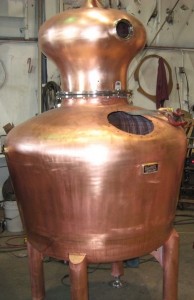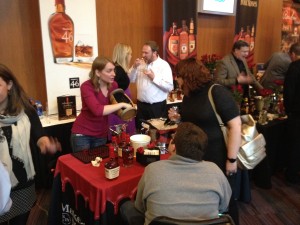
BY TIM KNITTEL

Did you miss it? I almost did and I follow bourbon news as a profession.
Danville is getting a new distillery. This in a town that was dry barely three years ago. It’s called Wilderness Trace Distillery and owners hope to have it open by September 2013. Their initial line-up will include a bourbon, a rye, a vodka and a sorghum-based spirit. Once open, Wilderness Trace will be the ninth craft distillery in Kentucky – most of which opened (or re-opened) in the last five years.
Craft distilleries are exploding across the scene much like the craft breweries did, which is not surprising. After all, distilling is mostly done from beer (or other fermented product) and represents the next logical step for the craft alcohol industry. The surprising element is the speed the craft distillation movement is growing.
There’s no one single history of the craft brewing movement, but most accounts trace the movement to the 1970s or 80s. As Mark Twain famously said, “I want to be in Kentucky at the end of the world because Kentucky is always 20 years behind.” True to form, Lexington got its first brewery in 1995 – the Lexington City Brewery – but it didn’t stay open long. Now Lexington sports three breweries (with two more set to open in 2013) and Danville has two – enough that there’s a brewgrass trail! (http://brewgrasstrail.com/)
Kentucky is ahead of the curve (eat that Twain!) with craft distilling. The American Distilling Institute recently held its annual Judging of Artisan American Spirits competition – for only the 7th time. DISCUS, the national distiller’s trade association and self-governing body, added a craft distiller membership category a scant three years ago.
This flurry of distillation activity puts the consumer of fine spirits – especially bourbon – in an odd spot. Of the eight currently operating craft distilleries in Kentucky, only half – MB Roland, Old Pogue, Town Branch* and Willett – currently offer bourbons. And one – Corsair – had a limited release bourbon that’s come and gone already.
Because of bourbon’s strict requirements and because it needs to barrel age to be quality, distilleries can’t produce bourbons for years after starting production. We can expect to see bourbons from most (if not all) of the craft distilleries, but we’re going to have to wait for them.
Most of the spirits being produced now by the Kentucky craft distillers are vodkas, corn-based “moonshine” clear liquors (some with flavors added), lightly aged rums or very experimental spirits (quinoa whiskey, anyone?).
That’s not to imply that these companies’ spirits are bad – they’re just different and maybe unexpected. For the consumer looking to try something new and possibly exciting, there’s a lot of potential with craft spirits. But they’re not cheap – typically in the $25 to $50 range (or more) for a 750 ml bottle. Some spirits are available in 375 ml bottles but the price per ounce is in the same range. Unless you have an unlimited budget for collecting spirits which you may or may not actually enjoy, trying these by the bottle is not really feasible.
Traditionally, the way to sample spirits is to buy the little ‘mini’ bottles near the registers of liquor stores. These are typically 50 ml bottles in the $0.99 to $4.99 price range. But those are exclusively the realm of the big spirits producers – none of the craft distillers are releasing mini bottles.

If you can’t make it to a sampling event, consider hosting your own. Invite a bunch of friends and ask each person to bring a bottle of artisan spirit. That way everyone can taste a large selection without having to personally shell out for every single bottle.
But the best way to sample them is just to go to each distillery by taking the Kentucky Bourbon Trail Craft Tour™. Like the original tour, the craft distilleries are open to visitors for tours and samples. There’s a separate passport and an even better prize for completing the trail – a classic Kentucky julep cup. Be advised: unlike their larger counterparts, the craft distillers are open much shorter hours, and usually only a few days a week.
You can get more information about the Kentucky Bourbon Trail Craft tour including tours hours for each distillery at the official Kentucky Bourbon Trail® website: http://kybourbontrail.com.
* Town Branch is included with the Heritage Distilleries in the Kentucky Bourbon Trail® list but often sends its bourbon for judging as an artisan spirit.
This article appears on page 5 of the April 11, 2013 print issue of Ace.




